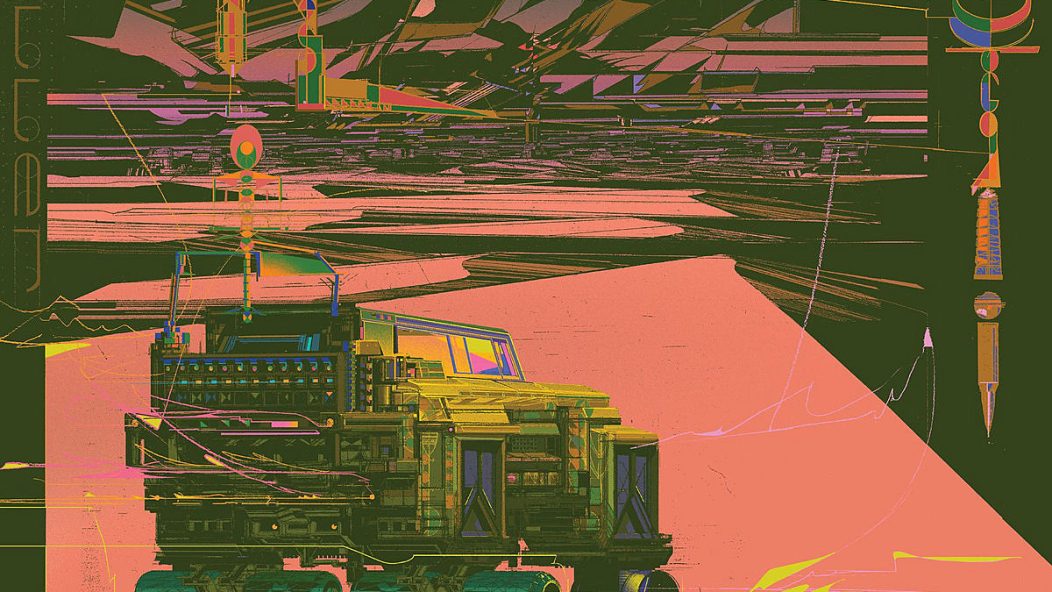
Author & Punisher Revels in Transcendent Disillusion On "Krüller" (Review)
Author & Punisher takes industrial metal to its maximalist extremes. A one-man project headed by Tristan Shone, Author & Punisher’s densely tactile take on the genre is as much defined by its oppressive, mechanistic heaviness as it is the viscous layers of melodic beauty that Shone injects through the mesh of grinding gears. These two polarities operate in total synergy, transposing their textures onto each other and colliding in a brain-melting clash of synthetic circuitry.
Industrial metal has rarely sounded as enormous as it does on Krüller. This brutal maximalism is achieved in part through Shone’s strong command of pathos and patience. He gifts the myriad layers of instrumentation ample time and space to grind, clang, jitter, crackle, and erupt. These eight tracks’ rhythms rarely match the blood-pumping, drum machine-led kineticism usually associated with industrial music. Instead, Krüller lumbers and crawls, like the futuristic tank adorning its cover.
…
…
The whole 51-minute experience exists on a vast digital canvas, one coated in weighty layers of harsh and bold synthetic textures. To achieve this, Shone utilizes a remarkable collection of homemade instruments. His set up (both live and in his studio) features imposing-looking creations made from metallic levers and pistons, as well as a microphone that wraps across his face like an uncanny robotic grin. Similar to the protagonist of Tetsuo: The Iron Man, Shone seems to have fused himself with his strange machines. This gives the music heft and weight, as if the synthetic soundscapes have welded themselves with flesh and muscle.
This transhumanist aesthetic is the best lens through which to view Krüller. This collision of familiar, more human sounds with Shone’s harsh industrial textures makes for much of what makes the album so fascinating. Guitars are commonplace, highlighted by the brutal power chords of “Incinerator,” however they are drowned in a dense layer of piercing distortion that strips away their human qualities in place of something cold and robotic. The drums similarly blur the line between the organic and the synthetic. “Misery”’s drums flicker between skittish but familiar drum-machine beats and rhythms that are processed and so infused with bass and machinery that their human familiarity gets entirely stripped away.
This uncanny and eerie musical quality is compounded by Krüller’s prescient and unnerving thematic weight. Industrial music has always been closely aligned with dystopian imaginings – both paint similarly dark, mechanistic and violent vistas. Given the global events of the last few years, the genre’s aesthetic fascinations now seem especially ripe for exploration. The lyrics of Krüller’s opening track “Drone Carrying Dread” directly address these concerns, imagining a future of “streets ablaze” and “news of fire”. Shone has discussed the influence of Octavia Butler’s book Parable Of The Sower on the album, as well his fascination with the rise in self-sustaining prepper culture.
Perhaps in response to Shone’s observations on the state of the contemporary world’s frayed social fabric, Krüller features numerous collaborations that expand on the closed world of Author & Punisher. Tool’s Danny Carey and Justin Chancellor feature on “Misery” and “Centurion” respectively, Shone’s wife appears as a backing vocalist on “Maiden Star”, while Phil Sgrosso (Shone’s manager and As I Lay Dying guitarist) wrote much of the album’s initial guitar parts. This eagerness to collaborate gives Krüller a potential moral bent, as if suggesting that it could function as an antidote to the disharmony of modern society. It also implies that, within Shone’s sonic universe so defined by the collision of man versus machine, it’s the human that might emerge as the ultimate victor.
…
Krüller releases today via Relapse Records.










